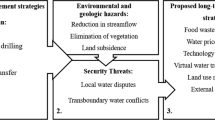
Access this book
Tax calculation will be finalised at checkout
Other ways to access
About this book
The book begins with a section of introductory chapters describing water systems, institutions, constraints, and similarities in the following regions: Israel and the Middle East, Turkey, California, Florida, and Australia. Four of these regions face similar climates with wet winters and dry summers. Florida has a more even seasonal distribution of rainfall, yet it uses similar management strategies in controlling groundwater demand and water quality.
The book concludes with a section on water management case studies. These case studies examine issues of conflict related to both water quality and water quantity. While the case studies address both international and intranational concerns in specific regions of the world, they portray broad principles that are applicable to many regions.
Similar content being viewed by others
Keywords
Table of contents (24 chapters)
-
Front Matter
-
Introduction and Overview
-
Front Matter
-
-
Regional Water Constraints: Middle East, California, Florida, and Australia
-
Front Matter
-
-
Economic Modeling of Decentralized Water Management Policies
-
Front Matter
-
Political Economy of Water Allocation
-
Water Institutions: Transition to Markets and Other Decentralized Allocation Mechanism
-
Editors and Affiliations
Accessibility Information
PDF accessibility summary
Bibliographic Information
Book Title: Decentralization and Coordination of Water Resource Management
Editors: Douglas D. Parker, Yacov Tsur
Series Title: Natural Resource Management and Policy
DOI: https://doi.org/10.1007/978-1-4615-6117-0
Publisher: Springer New York, NY
-
eBook Packages: Springer Book Archive
Copyright Information: Springer Science+Business Media New York 1997
Hardcover ISBN: 978-0-7923-9914-8Published: 30 April 1997
Softcover ISBN: 978-1-4613-7803-7Published: 29 October 2012
eBook ISBN: 978-1-4615-6117-0Published: 08 July 2011
Series ISSN: 0929-127X
Series E-ISSN: 2511-8560
Edition Number: 1
Number of Pages: XI, 451
Topics: Hydrogeology, Environmental Economics, Environmental Management



